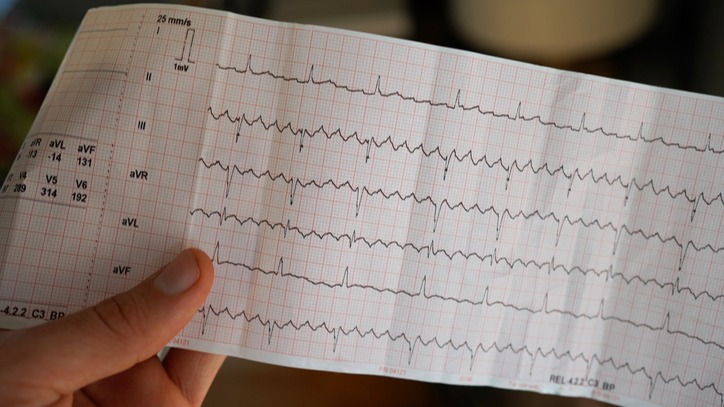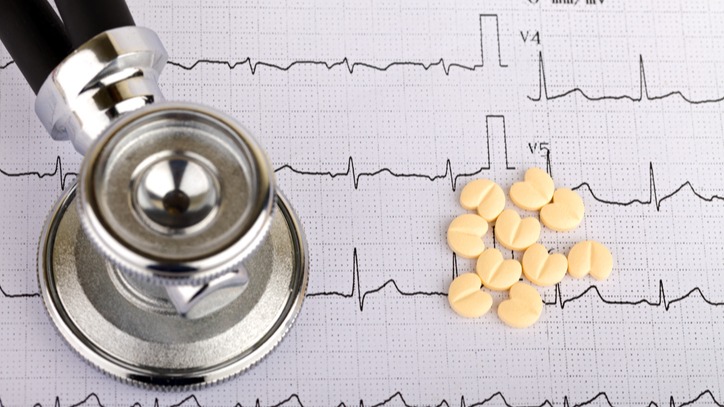
Author’s Note: To protect “Ed’s” privacy, the details of his story have been altered. Ed’s signs and symptoms of AFib [MM1] may not be the same as other patients with this disorder. If you have any questions or concerns about your heart or believe you may have AFib, consult your healthcare provider as soon as possible.
My patient Ed was 45 years old when he made an urgent appointment to see me about his heart.
My records showed that Ed was generally healthy. He worked in the municipal offices of one of the towns on Cape Cod, Massachusetts. One day, while working at his computer in his office, Ed felt a fluttering in his chest that lasted a few seconds. He was not overly alarmed since he knew these were palpitations and had felt them a few times a year for as long as he could remember.
The problem was that this time, these episodes happened almost daily and lasted around half an hour each. Ed was now worried that something was wrong.
I took a history and did a physical examination, then performed an electrocardiogram (ECG[MM2] ) on a machine in my office, which was normal. I made a referral to my colleague, a cardiologist, to see Ed the following day. He called me after the consultation and told me he was confident that Ed had non-valvular atrial fibrillation (AFib).

Understanding AFib
AFib is a common heart rhythm disorder characterized by an irregular and often rapid heartbeat. In a normal heart rhythm, the two upper chambers of the heart (atria) contract and pump blood into the two lower chambers (ventricles) in a coordinated manner. However, in AFib, the atria quiver (or fibrillate), leading to an irregular heartbeat.
Critical features of AFib include:
Irregular heartbeat: The heartbeat becomes irregular, and the rhythm may be chaotic.
2. Rapid heart rate: The heart may beat faster than normal, contributing to symptoms such as the palpitations that Ed was experiencing.
3. Atrial quivering: Instead of a coordinated contraction, the atria quiver, which affects the normal pumping of blood into the ventricles.
AFib can lead to various complications, including an increased risk of stroke due to the formation of blood clots in the atria. It is a common condition, particularly in older adults, although it can happen in men Ed’s age. Its prevalence tends to increase with age. While AFib itself may not always cause noticeable symptoms, it can still lead to severe health issues, making early detection and management crucial.
Complications of AFib
AFib can lead to various complications. One significant concern is the increased risk of stroke. The irregular heartbeat in AFib can cause blood to pool in the atria, forming blood clots. If these clots travel to the brain, they can result in a stroke. Additionally, the irregular heart rhythm can contribute to the weakening of the heart muscle over time, leading to heart failure. Individuals with AFib may also experience other cardiovascular issues, including a higher likelihood of developing coronary artery disease and hypertension. The condition can further exacerbate existing heart problems and may contribute to a reduced quality of life. Therefore, effective management of AFib is crucial and involves controlling the irregular heart rhythm and addressing and minimizing potential complications through medication, lifestyle adjustments, and close medical monitoring.

Treatment Options for AFib
Treatment for AFib aims to control irregular heart rhythm, manage symptoms, and prevent complications. There are various therapeutic approaches for AFib, and treatment choice depends on factors such as the severity of symptoms, underlying conditions, and the individual's overall health. Medications, including antiarrhythmic drugs and anticoagulants, are commonly prescribed to help regulate the heart's rhythm and reduce the risk of blood clots. Lifestyle modifications, such as maintaining a heart-healthy diet, exercising regularly, and managing stress play a crucial role in the management of AFib. Moreover, individuals with AFib who smoke, are advised to quit smoking and limit alcohol intake to manage their condition effectively.
Medical procedures may be considered when medications and lifestyle changes alone are not effective in controlling AFib. For instance, cardioversion—either through electrical shock or medications—may be employed to restore a normal heart rhythm. In some cases, catheter ablation procedures are performed to target and eliminate abnormal electrical pathways in the heart.
Selecting the most appropriate treatment strategy is often a collaborative decision between the patient and healthcare provider, considering the individual's specific health circumstances and preferences. Regular follow-up and monitoring are essential to ensure the effectiveness of the chosen treatment plan.
Recognizing the signs of AFib and promptly taking action are crucial for individuals who suspect they may have this heart rhythm disorder. The first critical step is to seek immediate medical attention. A healthcare professional can conduct diagnostic tests, such as an ECG, to accurately identify and confirm AFib. In addition, individuals need to communicate openly about any symptoms experienced, such as palpitations, irregular heartbeat, or fatigue, providing detailed information for an accurate diagnosis. Once the diagnosis of AFib is confirmed, adherence to the prescribed treatment plan becomes vital. This plan may involve the use of medications to regulate the heart rhythm and prevent the formation of blood clots, thereby reducing the risk of complications like strokes. Embracing lifestyle modifications is another integral aspect of managing AFib effectively. These modifications include adopting a heart-healthy diet, engaging in regular physical activity, and implementing stress management techniques. These lifestyle changes contribute not only to symptom control but also to overall heart health. Regular follow-up appointments with healthcare providers are essential for ongoing monitoring and potential adjustments to the treatment plan. Staying informed about AFib, understanding possible complications, and actively participating in discussions with healthcare professionals empower individuals to take charge of their heart health and enhance their quality of life.
Rely on PlanetDrugsDirect.com to Buy Online Eliquis (Apixaban) for Sale
As a trusted prescription referral service, we offer important benefits whenever you order online. Each of our partner pharmacies and/or government-approved dispensaries is committed to providing the best experience possible of any online prescription referral service on the internet. We offer:
Low prices
Quick turn-around times
Generic and brand-name medications
Unparalleled customer service
 Medically reviewed by
Medically reviewed by 





